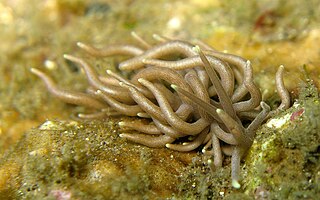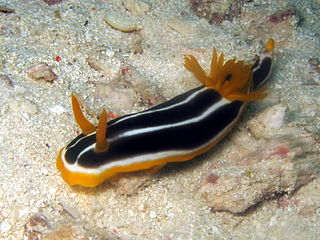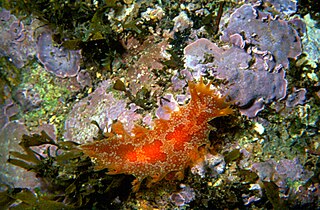
Notodoris minor is a species of sea slug. It is a dorid nudibranch, a shell-less marine gastropod mollusc in the family Aegiridae.

Goniobranchus annulatus is a species of sea slug, a very colourful dorid nudibranch, a shell-less marine gastropod mollusc in the family Chromodorididae.

Phyllodesmium is a genus of predatory sea slugs, aeolid nudibranchs, marine gastropod molluscs in the family Myrrhinidae.

The soft coral nudibranch, Tritonia sp. 1, as designated by Gosliner, 1987, is a species of small sea slug, a dendronotid nudibranch. It is a marine gastropod mollusc in the family Tritoniidae. As of November 2009, it was undescribed by science.

Chromodoris africana, or four-coloured nudibranch, is a species of colourful sea slug, a dorid nudibranch, a marine gastropod mollusc in the family Chromodorididae.

Goniobranchus tennentanus is a species of colourful sea slug in the family Chromodorididae.
Marionia cyanobranchiata is a species of dendronotid nudibranch. It is a marine gastropod mollusc in the family Tritoniidae.

Tritoniopsis elegans is a species of dendronotid nudibranch. It is a marine gastropod mollusc in the family Tritoniidae and is found in the western Indo-Pacific. It was first described by the French naturalist Jean Victoire Audouin in 1826, the type specimen being found in the Red Sea.

Tritonicula hamnerorum is a species of dendronotid nudibranch. It is a marine gastropod mollusc in the family Tritoniidae. A number of Caribbean species of Tritonia were moved to a new genus Tritonicula in 2020 as a result of an integrative taxonomic study of the family Tritoniidae.

Marionia blainvillea is a species of sea slug, a dendronotid nudibranch, a marine gastropod mollusc in the family Tritoniidae.

Marionia is a genus of sea slugs, specifically dendronotid nudibranchs, marine gastropod molluscs in the family Tritoniidae.

Hypselodoris nigrostriata is a species of sea slug or dorid nudibranch, a marine gastropod mollusk in the family Chromodorididae.

Diversidoris flava is a yellow species of sea slug, a dorid nudibranch, a shell-less marine gastropod mollusk in the family Chromodorididae.

Rhytisma fulvum, the sulphur leather coral, is a species of colonial soft coral in the family Alcyoniidae. It is native to shallow reefs in the Red Sea and the Indo-Pacific region. It was first described by the Swedish naturalist Peter Forsskål in 1775.
Tritoniella is a genus of sea slugs, specifically dendronotid nudibranchs. It is a marine gastropod mollusc in the family Tritoniidae.The genus was described in 1907 by the British diplomat and malacologist Charles Eliot.
Marionia albotuberculata is a species of sea slug, a dendronotid nudibranch, a marine gastropod mollusc in the family Tritoniidae.
Marionia pellucida is a species of sea slug, a dendronotid nudibranch, a marine gastropod mollusc in the family Tritoniidae.
Marionia ramosa is a species of sea slug, a dendronotid nudibranch, a marine gastropod mollusc in the family Tritoniidae.
Marionia viridescens is a species of sea slug, a dendronotid nudibranch, a marine gastropod mollusc in the family Tritoniidae.












